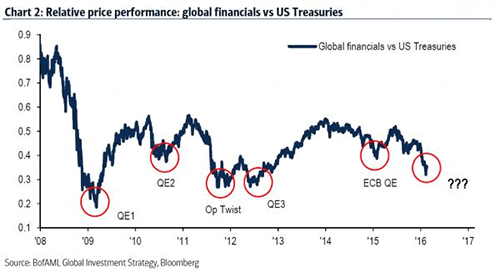Are we back in the Twilight Zone?
No, that headline isn’t a reference to Donald Trump’s impressive victory in South Carolina. He won the primary with a double digit margin over other Republican candidates. And in the odd world of American politics this is an important feat for practical reasons too. But I’ll leave the delegate system for Dan Denning’s American brain to explain another time.
The Twilight Zone is a stock market phenomenon. You won’t find it on any technical analysis chart of the FTSE 100 though. But it’s there. Fundamental analysis can’t help you find it either. By its very nature, the Twilight Zone defies fundamental rules. It has to. That’s the whole point.
Let me explain, because this might be the time to buy back into stocks…
Do you remember the “bad news is good news” phenomenon? Back when news suddenly started having the opposite effect it was supposed to on the stock market. If GDP or inflation were too low, the market would jump. High corporate profits would cause stocks to shudder. And unemployment was cheered in the trading pits.
Any finance journalist could’ve told you why at the time: every ounce of bad news made central bank intervention more likely. And central bank intervention gooses the stock market better than anything these days. It’s the whole point of quantitative easing (QE). Making stocks go up drives the “wealth effect” – people feel richer, spend more and then the economy does better. We hope.
And so for a while their bad news was good news. This topsy turvy world is the Twilight Zone of finance. We had escaped it for a few years. Good news was good again. The Federal Reserve raised rates. Then bad news was bad again. Big trouble in big China, an oil price plunge, bank default risk rising in Europe, an American recession on the cards – it was all bad news that drove most off the world’s stock markets into a bear market the last few months.
But now that bad news sent markets into bear territory, things are looking confusing again. Analyst after analyst is coming out with their best guess for just when central banks will be back in the mix. How low do stocks have to go before the next QE takes centre stage? When will we return to the Twilight Zone?
Bank of America came up with this chart to show how weakening financial shares tend to signal just when the American and European central banks flinch.

But there are many other indicators that suggest just when central bankers make a comeback. The price of credit default swaps (CDS) are like the price of insurance on default. These have been soaring back into crisis levels for countries and financial institutions around the world, suggesting a default is more likely. And that puts pressure on central bankers to be proactive. They don’t want to wait for default again like in 2008 with Lehman Brothers.
It’s not just CDSs and bank shares. The old problems haven’t been fixed either. There are more problems in China, the oil price is still in the doldrums, European sovereign debt is wobbling and so on.
But something changed two weeks ago. The stock market rallied without a change in the bad news cycle. It rallied impressively in the UK since early February. Does this mean we are back in the Twilight Zone? Is bad news good news again? Because if it is, you need to invest accordingly.
Investing in the Twilight Zone
How do you do that? Well the beauty of the Twilight Zone is that stocks are bullish. Unless you’re willing to call into question the effectiveness of stimulus, bailouts and printing money. Which very few people have an incentive to do, regardless of whether those actually work or not. After all, if the government doesn’t save us from the bear market, who will?
So buy stocks? Maybe. It’s far from clear we’re actually in the Twilight Zone yet. For now it seems like we’re in the Goldilocks Zone instead. Things aren’t hot or cold enough for markets to fall, rally or for central banks to do something. So we’ll have to wait till one of the three happens.
One way the Twilight Zone could end is if governments break the narrative. If they are willing to sacrifice global stability in favour of selfish motivations. Charlie Morris reckons the Chinese are about to do just that. He told The Fleet Street Letter subscribers about a critical event the Chinese government has in store for the world. And it won’t be pretty.
But Charlie’s main story is still what he calls the Dunkirk Moment. And it’s hotting up…
Category: Market updates

